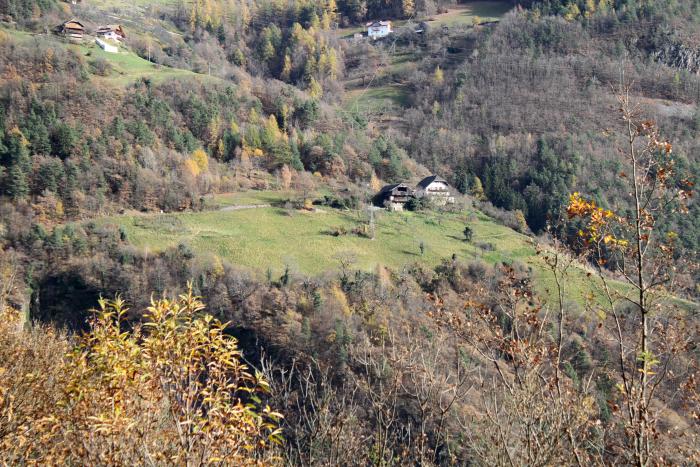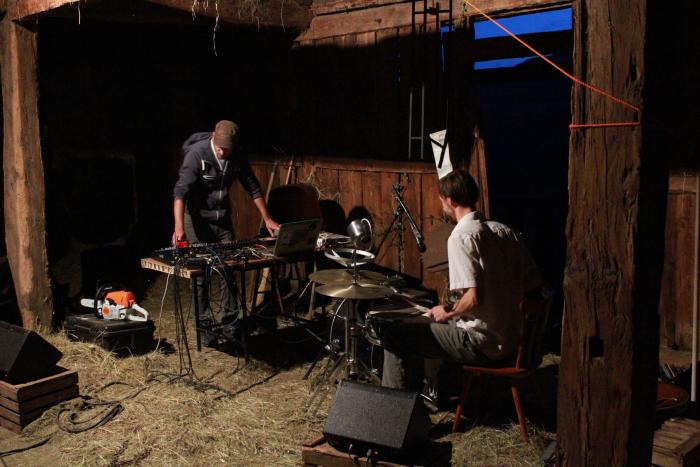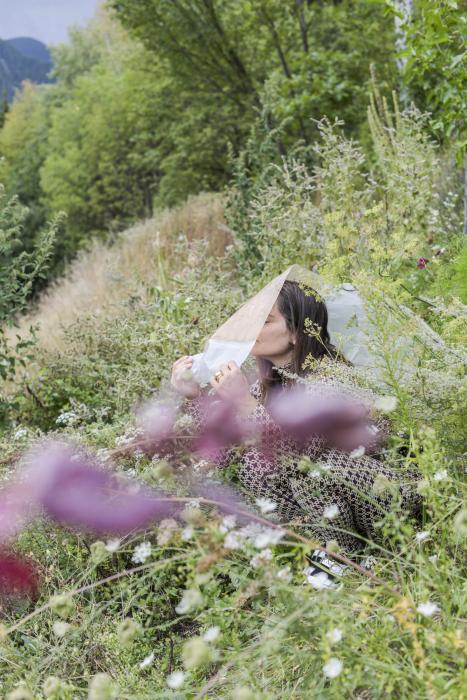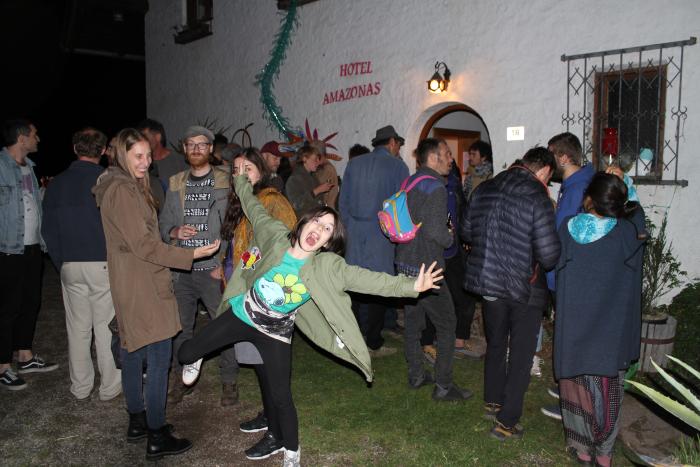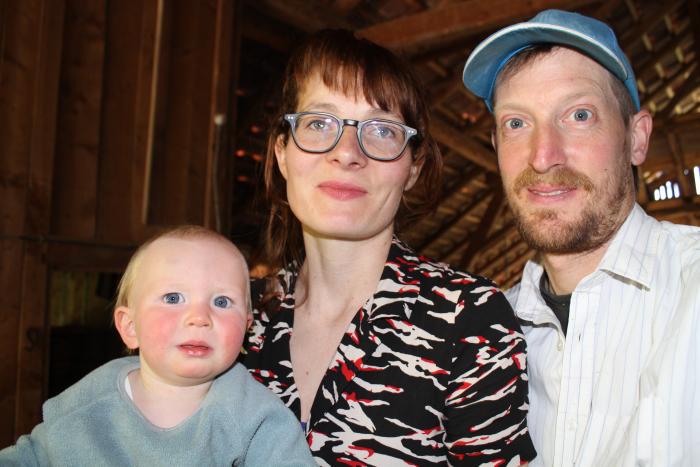I. SUMMARY INFORMATION
Project
267976
Status
Submitted
Award category
Mobilisation of culture, arts and communities
You want to submit
NEW EUROPEAN BAUHAUS AWARDS : existing completed examples
Project title
Hotel Amazonas
Full project title
Hotel Amazonas - Artist residency and cultural events on a farm in Italy
Description
Hotel Amazonas is an art initiative consisting of a residency program and pop up events, located on a mountain farm in the center of South Tyrol in Italy. Since 2012 it is experimenting with various formats to initiate temporary communities in which nature, agriculture, art and people meet at eye level and stimulate mutual awareness and sustainable exchange. The extensively run farm is a playground for the invited artists and audience and also an immersive venue for the art shows.
Where was your project implemented in the EU?
Italy
South Tyrol
Unterwangen 18
Ritten
39054
When was your project implemented?
Has your project benefited from EU programmes or funds?
No
Which programme(s) or fund(s)? Provide the name of the programme(s)/fund(s), the strand/action line as relevant and the year.
II. DESCRIPTION OF THE PROJECT
Please provide a summary of your project
Hotel Amazonas is an art initiative consisting of a residency program and pop up events, located at the remote Aspmayrhof in the center of South Tyrol in Northern Italy. Since 2012 we’re experimenting with various formats of events to initiate temporary communities in which nature, art and people meet at eye level and stimulate mutual awareness and sustainable exchange. The extensively run farm is a playground and inspiration for the invited artists and audience and also an immersive venue for the art shows that take place. Hotel Amazonas was founded by the artist and farmer Margareth Kaserer and is curated and organized by her with various collaborators.
Soon after the residency program came into life, Margareth started together with her partner, the artist Simon Steinhauser, the farm project, which is also the place where she grew up. It is located in an intact and a very diverse natural landscape, on a steep slope with a breathtaking view to the valley and beyond. Over the last 9 years they were changing the face of it from a “sleeping beauty” into a lively and diverse home for myriads of plants, animals, humans and other species. Chestnut trees, pigs in the forest, sheep, chickens, cats, potatoes, pumpkins, berries, apples, pears, beetroots, salads, tomatoes, herbs, flowers, walnuts, vines, plums and so forth. A child named Julius that comes in 2020.
Everything grew alongside and everything asks for the mobilisation of different resources. Within the next two years we’re planning to help our barn to prolong its life and to invest in the necessary support of its structure. In order to take into account and connect various needs of the place we plan to build a multifunctional space inside the barn: one that can host people and events and at the same time help us in the production and storing of farm products. In the lower levels of the building the sheep keep on having their home and also their hay for the winter is stored there.
Please give information about the key objectives of your project in terms of sustainability and how these have been met
We’re aware that the art world with its constant travelling, it’s fast pace of changing shows and “trends” is not at all sustainable in itself and that it needs a re-thinking of the ways art is produced and how relevant outcomes can inform spaces or communities spread all over the globe.
On the contrary a small subsistence oriented farm like ours and like many others in our neighbourhood show how a life aware of and connected with myriads of eco cycles can be possible, knowing of course also that a constant monitoring of own producer and consumer decisions of us inhabitants is necessary.
“To use what is there”, to use and re-cycle existing potentials and resources efficiently, is one of our main credos. For residency periods the farmhouse is transformed into a co-living place for up to 4 people (and more) plus us. No further building of infrastructure is needed. Its rooms and the area surrounding it, the barn, the cellar, and the garden become exhibition, concert or performance areas. Artists are inspired by materials that they find here and they include them in their works. The budget restricts the investments, but its boundaries also challenge creativity. Our program is limited to one or a few events during the year, where we concentrate energies and visions. For the rest of the year we’re working on the farm in the changing seasons and we work also outside of it.
Please give information about the key objectives of your project in terms of aesthetics and quality of experience beyond functionality and how these have been met
Hotel Amazonas’ main interest is contemporary boundary pushing art as it is expected to be found rather in metropolitan areas than in the province. In Hotel Amazonas projects there’s an extremely interesting clash happening between three elements: the avant-garde artist visions, the farm space that evolved along strong traditions and the nature element. On this fertile grounds magic happens: a queer electronic singer and musician invites during FOOL MOON to a concert in the traditional wooden Stube (the living room) from the 19th century (Infinite Palace, 2019) where people were taking a wool bath an hour before; an exhibition of Manga and Graffiti inspired painted wood pieces between hay stacks in the barn (Marta Vovk, 2018); avant-garde club atmospheres in front of the barn with Easter (2019) or Asfast (2018); a legendary drum concert by Schrecken on the kitchen table as a stage (2015); an evening about the question of killing a pig with sound artist Caroline Profanter and writer Roberta Dapunt while being served freshly produced pig meat from the farm (2018); a sound piece with a chicken picking grains from Andreas Trobollowitsch (2017); an object composed by an emptied snow ball from a tourist shop and refilled with finest ashes from burnt chestnut wood (Saori Kuno, 2015)…
Summer cinema evenings with documentaries on the “The milk system” or lectures about topics as the gift economy, the basic income, inflatable architecture or anarchy provide further knowledge from different fields and meet their function to kick-off intense discussions. Since we move on both action fields agriculture and arts we’re able to bring different people together and create a discourse and a network of people that is potentially opening horizons to each other.
Please give information about the key objectives of your project in terms of inclusion and how these have been met
Hotel Amazonas has the “hotel” in its name. It stays for an ideal or a poetic space, also for a democratic place, a roof above the head for travellers and a meeting point, an island, no matter where people are from, no matter what they believe, how they look, who they love and what their gender or social status might be. In reality the access to hotels is usually determined by the economic power of clients and thus works rather excluding for many social classes.
Our invitations in general are always as open and inclusive as possible. In the last years we were focussing to offer our space to an increasing degree to female voices, just because we could observe a gender inequality looking at commissioned artists at art shows around us. This meant also to invite mother artists with small children or to make space for artist families.
Many LGBTQ artists or artist groups have visited Hotel Amazonas. Margareths own growing up as a performance artist is rooted in a queer performance band in Belgium.
In terms of provenance of artists we work with both local and international artists – we believe that it’s important to strengthen the local scene as well and to offer chances to connect internationally.
For sure there is definitely still an upward potential to heighten our awareness and to work even more inclusive, for example regarding artist communities including PoC.
Regarding the physical accessibility: our remote farm is not so easy to reach by public transport, so we would organize a private shuttle bus driving to our events, for people who don’t have a car or a drivers license. There’s always a free spot to sleep over for the travellers and adventurers. Usually there’s free entrance to our events, rarely we ask for a little contribution, which is just “pay as you can”.
Please give information on the results/impacts achieved by your project in relation to the category you apply for
Around 80 artists, mainly from Europe, have been visiting Hotel Amazonas since 2012, amongst them also internationally recognized artists from different fields like Melanie Bonajo (visual art and film, upcoming: Netherlands pavilion, Venice Biennial 2022), Voodoo Jürgens (singer and songwriter), Peter Kutin (sound artist), Manuela Kerer (composer), Roberta Dapunt (writer), Futurefarmers (visual art, research), Julius Deutschbauer (performance). We were one of the first non-institutional artist residencies installed in the region, in the following years a few more initiatives popped up. A fruitful exchange between residencies and their visitors was starting which was also enriching the whole art landscape of this territory.
In our cultural events or mini-festivals we were exploring themes such as „utopia“, „fermentation“ or „wasteland“, connecting agricultural topics with political, social and aesthetic discourse. We were claiming a new life for this farm previously on pause and were seeking the realization of a deep connection between life and art. The intense presence of agriculture and art at the same time ennobles both, they can benefit from each other. Through the meeting of artists, curators and art-loving people new networks and friendships emerge, creating new bonds to the land and the region of South Tyrol. We could also welcome people who usually don’t attend art events, but were just curious to see what’s happening in the neighbourhood, and in the course of that they would get involved in discussions with people from the art scene – and vice versa those can meet farmers and their issues.
Please explain the way citizens benefiting from or affected by the project and civil society have been involved in the project and what has been the impact of this involvement on the project
As Hotel Amazonas started to have some echo and presence in media, people realized that there is a place in the mountains above Bolzano where exciting art events happen. Citizens benefit from a place that is open from time to time, where people can meet and exchange, and where they can experience art on a high level and in very unexpected frames.
Society might benefit also from the fact that we keep on doing our small-scale agriculture as it has been done since four generations of Margareths family, that we preserve the landscape as it has been shaped by our ancestors, that we take care for soil health and natural diversity and that we produce healthy food.
Please highlight the innovative character of the project
Hotel Amazonas offers to artists a space to produce and show new work, to exchange with other artists and at the same time to experience everyday agricultural life. Artist residencies can be often found in abandoned areas or houses, but they’re usually not run by a small farmers family business. We believe that those insights into the highs and lows of serious farming can affect a whole artists vision on nature, co-living with different species, on how much care is needed to produce and sell quality food.
With Hotel Amazonas we challenge the usual expectations towards art production and the presentation of it as well as vice versa the function of small mountain agricultures whose futures are not written yet.
Invited people and also guests of the shows are offered a participatory setting in private areas, because we want to generate radical openness towards each other and the environment.
Our plan for the coming two years is to renew the wooden upper level of the barn in order to create a space that can combine both agriculture and art on a functional level. The space will be multifunctional while staying pretty minimal in its style. Artists can be offered proper and bigger workspaces that are reliable also when it rains. We can diminish to be exposed to the vicissitudes of the weather during our events or workshops. We will add a space for food processing and storing. The rest of the building, its fundament and the lower level remain with its old stone structure and function as hay store and winter dwelling for the sheep.
Please explain how the project led to results or learnings which could be transferred to other interested parties
Our yearlong experience in juggling art events, the farm and other necessities we became experts in doing many things at the same time. We had to learn painfully that you couldn’t have it all. You must make a choice/many choices during a day and then deal with the consequences.
Don’t expect to be overrun the first time you open your door for an event in the countryside. It takes time till people come out, especially when you’re just returning to your old home town and you lost contacts over the years.
Artists are some of the most generous types of people, at least when they’re still working on their career. Many things can be done easier together.
Never give in to be being blown up as hype, always stick to your rules.
It’s an interesting question to think about where we have gained expertise that we could share. But actually we think that trying out things on your own with a fresh spirit without having somebody older like us telling you how to do things best, is much more rewarding and its also the way how we were and still are approaching Hotel Amazonas.
Is an evaluation report or any relevant independent evaluation source available?
No
III. UPLOAD PICTURES
IV. VALIDATION
By ticking this box, you declare that all the information provided in this form is factually correct, that the proposed project has not been proposed for the Awards more than once under the same category and that it has not been subject to any type of investigation, which could lead to a financial correction because of irregularities or fraud.
Yes
